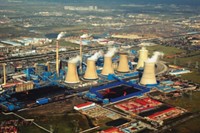Advertisement
Grab your lab coat. Let's get started
Welcome!
Welcome!
Create an account below to get 6 C&EN articles per month, receive newsletters and more - all free.
It seems this is your first time logging in online. Please enter the following information to continue.
As an ACS member you automatically get access to this site. All we need is few more details to create your reading experience.
Not you? Sign in with a different account.
Not you? Sign in with a different account.
ERROR 1
ERROR 1
ERROR 2
ERROR 2
ERROR 2
ERROR 2
ERROR 2
Password and Confirm password must match.
If you have an ACS member number, please enter it here so we can link this account to your membership. (optional)
ERROR 2
ACS values your privacy. By submitting your information, you are gaining access to C&EN and subscribing to our weekly newsletter. We use the information you provide to make your reading experience better, and we will never sell your data to third party members.
Environment
Climate-Change Issues Heat Up G-8 Talks
Rift between U.S. and Germany remains stark at start of summit
by Bette Hileman
June 11, 2007
| A version of this story appeared in
Volume 85, Issue 24
Even before the start of the June 6–8 summit of leaders of the Group of Eight leading industrial nations, climate change emerged as one of the pivotal issues. Disparate climate policies have caused rifts between the U.S. and Europe that are unlikely to be resolved during the meeting.
In addition, China announced its climate-change goals, saying it would raise energy efficiency 20% by 2020 and increase the use of renewable resources, but it rejected binding emissions targets. Although China is not an official G-8 member, it will participate in the talks along with other leading developing countries such as India, Brazil, and South Africa.
Germany, which holds the presidency of the G-8 this year, has crafted a declaration for the G-8 members to sign that would establish new post-Kyoto protocol goals on climate change. The declaration proposes to freeze global greenhouse gas emissions within the next 10 to 15 years, cut those emissions to 50% of 1990 levels by 2050, and limit global warming to 2 °C above the preindustrial level of about 1880. In addition to Germany, G-8 members include Canada, France, Germany, Italy, Japan, Russia, the U.K., and the U.S.
But President George W. Bush rejected these points. In a blunt memo, the White House wrote: "We have tried to 'tread lightly,' but there is only so far we can go given our fundamental opposition to the German position."
Instead, in a surprise move on May 31, Bush outlined a new strategy for setting worldwide goals to reduce CO2 emissions. By the end of 2008, he said, the U.S. and other nations will "set a long-term goal for reducing greenhouse gases." In addition, "each country would establish midterm national targets and programs that reflect its own mix of energy sources and future energy needs," he said. Separately, an Administration official explained that the U.S. would convene a climate conference of representatives from the world's largest economies, including India and China, as early as autumn. The official also said the established emissions targets would not be mandatory.
Bush's statements on climate, especially his proposal to hold talks outside the United Nations, were rejected by both German Chancellor Angela Merkel and British Prime Minister Tony Blair. On June 3 in Berlin, Blair said the G-8 meeting should set mandatory goals for reducing carbon emissions, pledge to establish a global carbon market, and commit to a UN-led process for addressing climate change.
Members of Congress were also critical of Bush's plan. In a press conference on June 4, Rep. Henry Waxman (D-Calif.) condemned the Bush proposal on climate change, calling it "a sham" and "not constructive." He added that "China has put something on the table that is real. It is enforceable and measurable."
A bipartisan group of senators wrote a letter to Bush on June 4, urging him to accept Merkel's proposal for a climate-change declaration. "We believe your support for [these principles] could open the door to the meaningful participation of developing nations in a global solution" to the climate problem, the letter said.





Join the conversation
Contact the reporter
Submit a Letter to the Editor for publication
Engage with us on Twitter